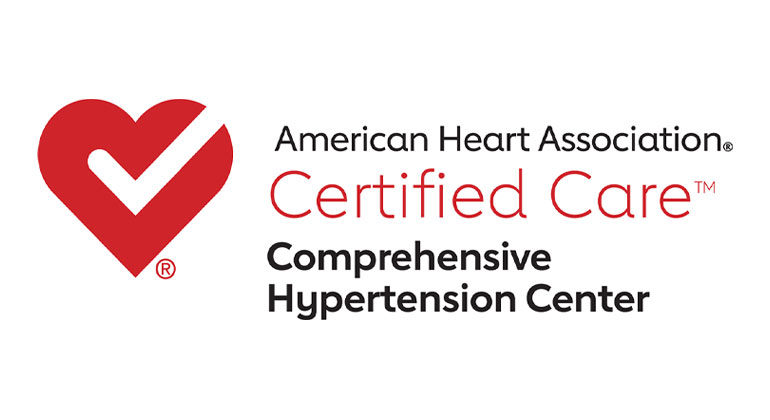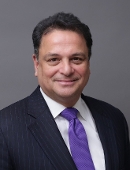High Blood Pressure

Blood pressure measures how hard your blood pushes against the arterial wall as the heart pumps blood through your body. High blood pressure, also called hypertension, occurs when that force exceeds the normal threshold. Doctors consider blood pressure to be a problem when it reaches 130/80 or higher. A common condition, hypertension affects about 47 percent of American adults (around 116 million people). Uncontrolled hypertension is a major risk factor for heart problems, including heart attacks, angina, strokes, congestive heart failure, and the formation and rupture of aortic aneurysms, bulges or weak spots in the main blood vessel that carries blood from the heart.
A hypertension specialist can help you lower your blood pressure. Mount Sinai Fuster Heart Hospital is at the forefront of hypertension care and a national leader in the management of hypertension and cardiovascular diseases. We provide the most advanced care available, in a supportive setting. In addition, we do research and run clinical trials. This means our patients have access to diagnosis and treatment options before they are widely available. We also work to educate the future generation of hypertension doctors.
Our center has been nationally recognized. The American Heart Association (AHA) has certified us as a Comprehensive Hypertension Center. In addition, the AHA and the American Medical Association classify us at the gold level, the highest available. We take the time to give you the care you need.
Risk Factors for Hypertension
Risk factors for hypertension include:
- Certain medications (including pseudoephedrine, nonsteroidal anti-inflammatory drugs, and psychostimulants)
- Diet high in fat and salt
- Insulin resistance (typically found in diabetic patients)
- Excessive alcohol consumption
- Family history
- Frequent stress and anxiety
- Lack of exercise
- Obesity
- Smoking
Conditions We Treat
We treat all types of hypertension, including uncontrolled and treatment-resistant hypertension. We have expertise in addressing both primary (essential) hypertension and secondary hypertension (caused by another specific condition). When we treat this second condition, blood pressure often goes down. Some of these conditions are:
- Adrenal tumors (adenomas)
- Chronic kidney disease
- Cushing syndrome and endogenous hypercortisolism
- Paragangliomas
- Pheochromocytomas
- Postural orthostatic tachycardia syndrome and dysautonomias
- Preeclampsia
- Primary aldosteronism
- Renal artery stenosis
- Renal vascular disease
Services We Provide
At Mount Sinai, we offer state-of-the-art diagnostics and treatment for hypertension. In addition to treating all the conditions listed above, we also offer the following services:
- 24-hour ambulatory blood pressure monitoring: This is considered the most accurate way to diagnose hypertension. We assess your blood pressure continually for 24 hours, including when you are asleep.
- Renal denervation: This treatment has been approved by the U.S. Food and Drug Administration (FDA) to lower blood pressure. We use a thin tube (catheter) to send waves of energy within the arteries that carry blood to the kidneys (renal arteries). This energy tones down the nerve signal that goes in and out of the kidneys and raises blood pressure.
- Second opinions: We review your medical records and provide a diagnosis and treatment plan. Second opinions can give you more insights into your condition and help you make treatment decisions.
Detection and Diagnosis
Many people with hypertension do not experience any symptoms. Those who do often report feeling flushed, dizzy, or lightheaded, or having dull headaches. But these symptoms are often associated with other conditions. That is why doctors check your blood pressure any time you have an appointment, even if you do not have a known heart condition. In this way, we hope to find any problem at the very beginning, when it is easiest to treat.
Health care providers measure blood pressure using a blood pressure cuff (sphygmomanometer). The cuff contains an inflatable balloon. We wrap it around your upper arm and fill it with air. The inflated cuff applies gentle pressure on your arm, enabling the device to measure the pressure inside the arterial walls. Blood pressure measurements provide two numbers. The first (systolic pressure) represents the pressure inside the vessel when the cuff is tight. The second (diastolic pressure) shows how hard your heart works under normal conditions, when the cuff is not creating challenges. High blood pressure is anything over 130/80.
To provide the best possible care, we work very closely with several Mount Sinai teams. We collaborate most closely with:
- The endovascular interventional cardiology team, which performs key procedures
- The vascular medicine team, which tackles issues with arteries and veins
- The Center for Inherited Cardiovascular Diseases, which addresses genetics and genomics






